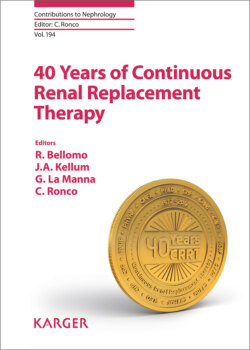Читать книгу 40 Years of Continuous Renal Replacement Therapy - Группа авторов - Страница 47
На сайте Литреса книга снята с продажи.
Can CRRT Improve Outcome?
ОглавлениеThere is controversy about whether CRRT itself may modify patient outcomes or whether, as a supportive therapy in the setting of high illness severity, it is largely a surrogate for the effect of critical illness on outcome. Observational data have shown that receiving any RRT per se may increase mortality risk among ICU patients with AKI [6, 14, 15]. These studies have compared outcomes among patients with AKI who received or did not receive RRT. While these data have methodological limitations common to observational studies, such as differences in populations studied (i.e., case-mix, illness severity), residual confounding by indication and uncontrolled bias (i.e., provider practice variation, information bias), an honest speculation does arise about whether, in selected circumstances, CRRT may contribute hazard to critically ill patients with AKI if not carefully selected or if perceived to have only marginal benefit [16]. Patient, provider, and institutional-level factors may interact to confound the observed association between RRT and outcome; however, these factors are often not accounted for in observational data. Similarly, many of these studies may have included patients in whom CRRT was never likely to improve outcome. For example, high utilization of CRRT for patients with very low survival probability (i.e., advanced chronic illness or severe acute illness) can represent an important source of bias, as these patients will shift effect estimates of risk of CRRT toward poor outcome [17]. Alternatively, inclusion of patients with less severe AKI and marginal indications for CRRT, where the likelihood of survival and kidney recovery was high regardless of CRRT, will also confound effect estimates of the hazards of CRRT [18]. In this circumstance, it is conceivable that the risk and/or harm associated with RRT per se could potentially outweigh benefit. Interestingly, additional observational data among critically ill patients with conventional indications for CRRT have shown starting RRT may improve survival [19, 20].
